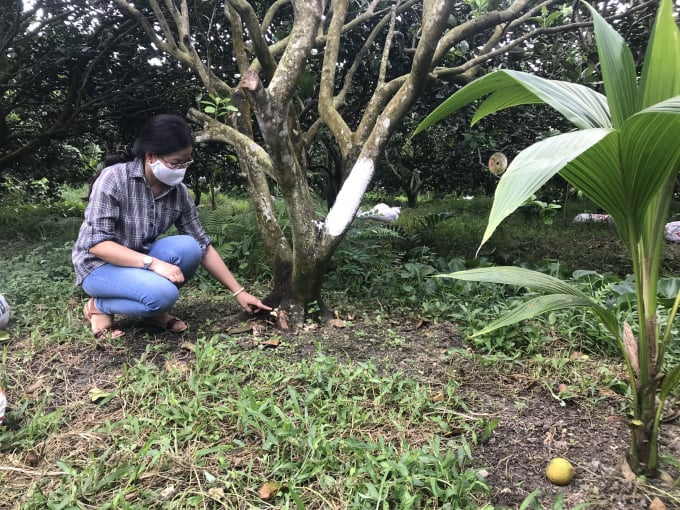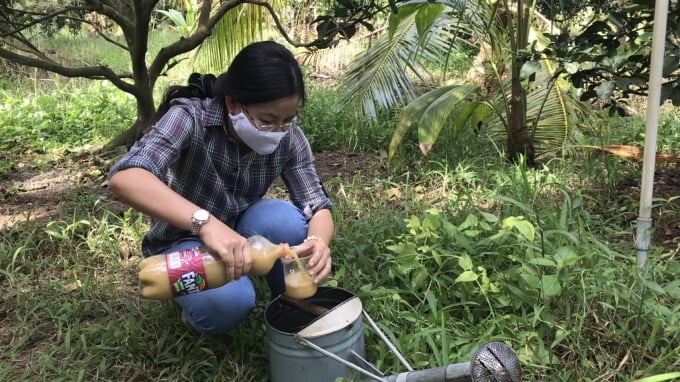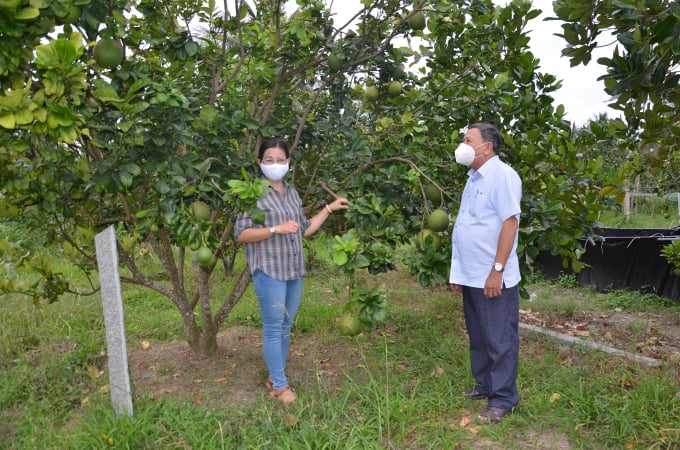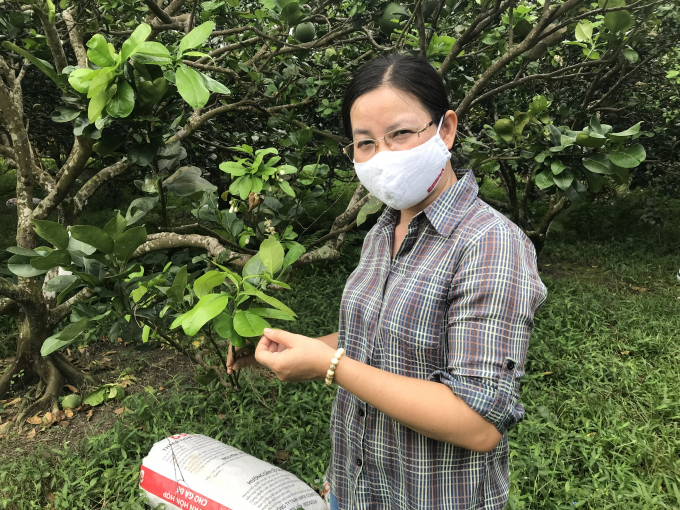May 21, 2025 | 04:36 GMT +7
May 21, 2025 | 04:36 GMT +7
Hotline: 0913.378.918
May 21, 2025 | 04:36 GMT +7
Hotline: 0913.378.918
The yellow leaf and rotten root on citrus trees is one of the diseases causing heavy losses to gardeners in the Mekong Delta. Many infected orchards have to be cut down since they are no longer productive. When the disease occurs, leaves become yellow, not only the young but also the older leaves. The cause of the disease is due to the plant's problem in absorbing nutrients. Some essential nutritional elements cannot be absorbed.

A green kin pomelo tree with yellow leaf and rotten root disease. Previously, the farmer had planted a coconut so that to be ready for replacing the infected pomelo. Photo: Minh Dam.
Roots are partially rotten. Young roots cannot develop either. The disease is reportedly caused by fungi such as Fusarium and Phytophthora. If not treated promptly, the plant will be exhausted and die after about one year.
According to experts’ surveys, the yellow leaf and rotten root disease on citrus trees in the Mekong Delta often occurs in gardens with over-intensive cultivation. In specializing citrus-growing areas, the disease can cause up to 30% loss. Farmers' solution is to cut down to replant other trees or improve the land to replant citrus trees.
To help farmers solve the problem and recover their citrus orchards at the lowest cost, a group of scientists from Tra Vinh University led by Dr. Pham Thi Phuong Thuy, Deputy Dean of the Agriculture and Fisheries Faculty has successfully studied and come up with an integrated solution based on the application of biotechnology, especially microorganism using two strains of microorganisms selected and developed by the university's research team.

Using the microbial organic solution to irrigate and restore pomelo trees with yellow leave and rotten root disease. Photo: Minh Dam.
With this solution, a type of microorganism first will be put into the soil to restore its useful microorganism system. This will help reduce mucus secretion caused by injured roots and "clean up" organic residues, making the soil become more airy and healthy.
After that, muti-mineral, medium, and microelements missing during the previous cultivation process will be put into the soil. After the roots have begun to recover, other organic nutrients will be added to the soil. At this time, the young roots have also developed, absorbed nutrients, and become stronger, helping the plant to recover better.
First, it is necessary to prepare an organic solution of microorganisms combined with a number of multicenter and microelements. Then, mix 200ml of this solution with 20 liters of water to irrigate each plant. Use it for each cycle time of about 5-7 days. This microbial organic solution will help restore the roots.
After 30-40 days, the plant’s young shoots will form. At this time, farmers need to add inorganic fertilizers with a recommended dosage of 200 grams of N-P-K compound per stump.

Dr. Pham Thi Phuong Thuy exchanges and guides Mr. Vo Van Thuan about some techniques in restoring green-skinned pomelo with yellow leaf and rotten root disease. Photo: Minh Dam.
At the same time, farmers should buy cow manure to spread around the stump. In particular, to help farmers save time in composting manure, the research group introduced a microorganism strain that helps to quickly decompose manure while fertilizing the stump. In this way, the soil biota develops very strongly, most of which are beneficial bacteria. This group of microorganisms will help protect plant roots very well.
When the plant is completed recover, during cultivation, it is possible to add microbial organic solution after 2-3 months to help the plant stay healthy and avoid yellow leaf and rotten root disease.
During this process, farmers should note that the soil must not be plowed because it can damage the young roots. They should only cut the grass, clear the space around the tree to be airier. Absolutely do not apply lime because it can kill young roots. However, in recent years, saltwater intrusion has often occurred in the Mekong Delta, so for the orchards affected by salinity, it is necessary to wash away the saltwater before starting the process of recovering infected plants.
According to experimental research by Tra Vinh University scientists, in some pomelo orchards of Chau Thanh District (Tra Vinh Province), the cost of restoration for each tree is only about VND50,000. This opens up new directions for citrus sustainable cultivation, especially the pomelo. According to Dr. Thuy, this solution is currently being implemented on pomelo and orange trees-the two types of trees that account for most of the country's citrus area.

Currently, the method provided by Tra Vinh University for recovering pomelo trees with yellow leaf and rotten root disease is known to have low cost and high efficiency. Photo: Minh Dam.
Mr. Vo Van Thuan, Chairman of the Farmers' Association of Chau Thanh District, Tra Vinh Province said he has a 4,000m2 green-skinned pomelo garden with over 60 trees in Soc Thap hamlet, Nguyet Hoa Commune. Although the pomelo garden is just over 6 years old and has produced fruit for two seasons, there have been 6 trees with yellow leaf and rotten root disease. Thanks to the method introduced by Tra Vinh University, Thuan did not have to cut down any pomelo trees. Now the trees have given very healthy new shoots.
Thuan said excitedly: “Up to now, I have applied 5 times the microbial organic solution provided by Tra Vinh University. After 1 month, the leaves have sprouted green, the fruit has also changed color and looks smoother. Comparison of before and after, the recovery result shows a lot of difference, especially the young shoots are longer, thicker, and stronger. Some of the yellow leaves also turned green.”
Translated by Linh Nguyen

(VAN) Japan's grant aid project contributes to capacity building, promoting organic agricultural production, and fostering sustainable community development in Dong Thap province.

(VAN) For years, the CRISPR-Cas9 genome technology has been reshaping genetic engineering, a precision tool to transform everything from agriculture to medicine.

(VAN) Vietnam aims to become a 'leader' in the region in the capacity and managing effectively soil health and crop nutrition.
![Reducing emissions from rice fields: [Part 1] Farming clean rice together](https://t.ex-cdn.com/nongnghiepmoitruong.vn/608w/files/news/2025/05/05/z6509661417740_a647202949c539012a959e841c03e1d3-nongnghiep-143611.jpg)
(VAN) Growing clean rice helps reduce environmental pollution while increasing income, allowing farmers to feel secure in production and remain committed to their fields for the long term.
/2025/05/19/5136-1-144800_230.jpg)
(VAN) The Nghe An Provincial People's Committee has just approved the list of beneficiaries eligible for revenue from the Emission Reductions Payment Agreement (ERPA) in the North Central region for the year 2025.

(VAN) 14 out of 35 domesticated elephants in Dak Lak province have had their living conditions improved, with 11 of them currently participating in the non-riding elephant tourism model.

(VAN) Muong Nhe Nature Reserve hopes that being upgraded to a national park will lay the foundation for forest protection efforts to be carried out in a systematic, modern, and sustainable manner.